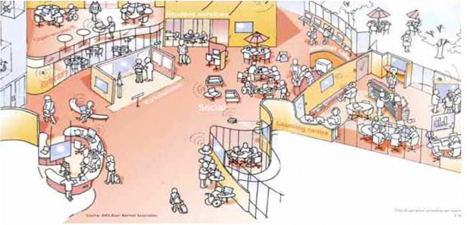CADIC Offline Support Services
CADIC clusters differ in many ways: they involve different countries, industries and firm realities. They also differ in their size, purposes, absorptive and management capacity, and level of engagement. A priori, this may create the idea that to deal with such diversity and support CADIC clusters successfully towards growth and renewal a wide range of tools will be necessary. Contrarily though, this apparent complexity has led us to the opposite strand so to favour the building of a limited but rich-content set of tools; i.e. a few tools whose effectiveness and suitability is given by
broad scope of applicability (multiplicity of uses, meaning adequacy to different problems and contexts, at different development stages), strong synergies and symbiosis (high leverage potential), easiness of use and cost-efficiency drive.
At the core of the development logic for cCADIC's offline services are thee key concepts:
- Bottom-up built,
- Cooperation enabling,
- IC flows driven.
in general,the offline services that support CADIC SME clusters focus on building in the conditions and capabilities conducive to purposeful and IC-driven collaboration.Hence, the methodologies and tools incorporated in these services share the following principles:
- Creating timely awareness of and dealing with potential barriers (e.g. psychological, market, environmental, resources or relational based, etc.) and difficulties stifling the partnership or hindering any of the cluster 3C’s – Communication, Connections ( relationships), and Collaboration;
- Developing, or containing within, the catalytic mechanisms to spur and enable IC flows meanwhile removing such barriers;
- Harnessing simultaneously the network management capabilities of the cluster and the partner firms;
- Promoting trust and instilling a cultural shift (collaboration oriented) in each of the partner members;
- Making of change and ambiguity the common groundwork of networks management, and trust building, win-win relationships and continuous learning the catalysts of that change.
- Collaboration Topic;
- Cluster Communication Guideline;
- Evaluation and Monitoring Workshop;
- Flexible Learning Environments;
- Organisational Relational Model;
- Partner Assessment;
- Vision workshop
- and the CADIC IC benchmarking system

